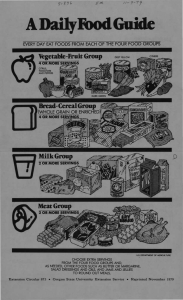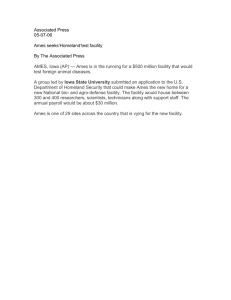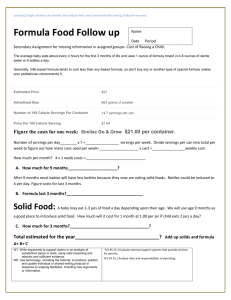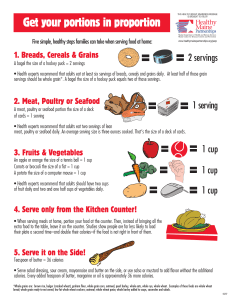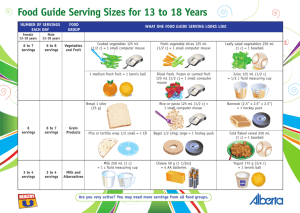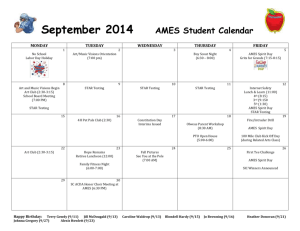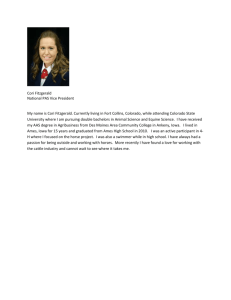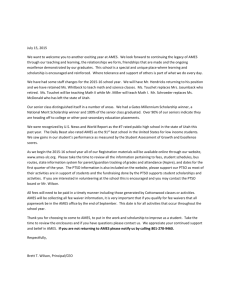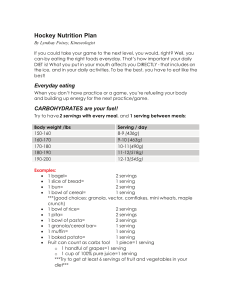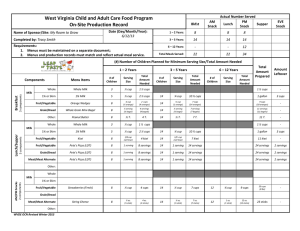6-10 Years - Dunwoody Pediatrics
advertisement
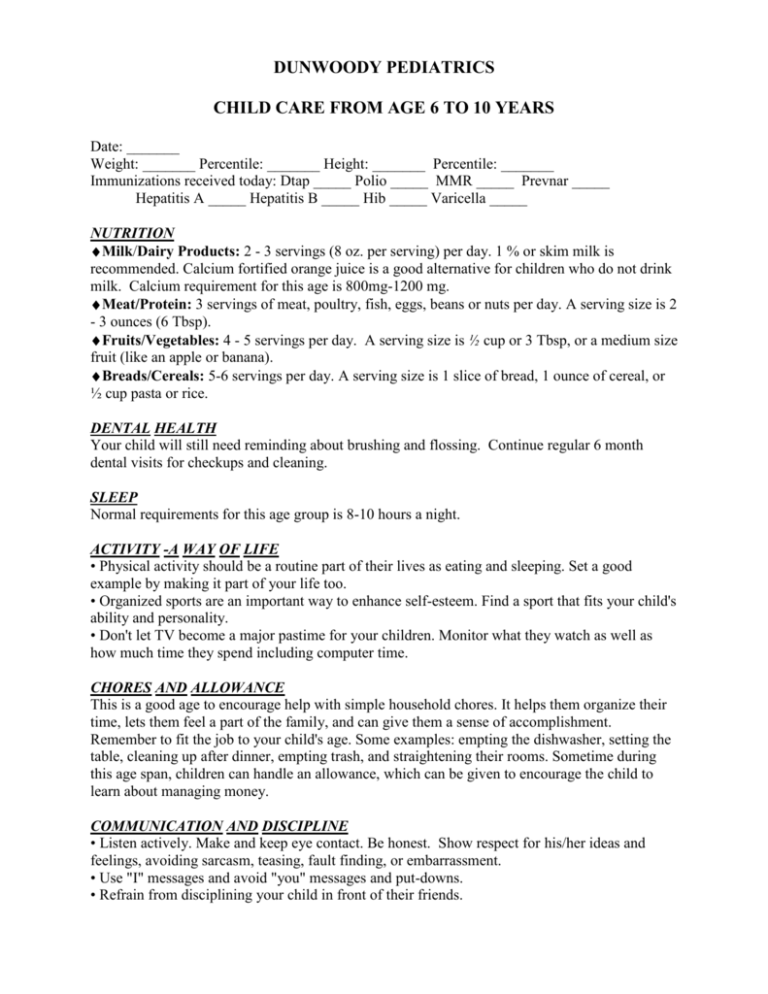
DUNWOODY PEDIATRICS CHILD CARE FROM AGE 6 TO 10 YEARS Date: _______ Weight: _______ Percentile: _______ Height: _______ Percentile: _______ Immunizations received today: Dtap _____ Polio _____ MMR _____ Prevnar _____ Hepatitis A _____ Hepatitis B _____ Hib _____ Varicella _____ NUTRITION Milk/Dairy Products: 2 - 3 servings (8 oz. per serving) per day. 1 % or skim milk is recommended. Calcium fortified orange juice is a good alternative for children who do not drink milk. Calcium requirement for this age is 800mg-1200 mg. Meat/Protein: 3 servings of meat, poultry, fish, eggs, beans or nuts per day. A serving size is 2 - 3 ounces (6 Tbsp). Fruits/Vegetables: 4 - 5 servings per day. A serving size is ½ cup or 3 Tbsp, or a medium size fruit (like an apple or banana). Breads/Cereals: 5-6 servings per day. A serving size is 1 slice of bread, 1 ounce of cereal, or ½ cup pasta or rice. DENTAL HEALTH Your child will still need reminding about brushing and flossing. Continue regular 6 month dental visits for checkups and cleaning. SLEEP Normal requirements for this age group is 8-10 hours a night. ACTIVITY -A WAY OF LIFE • Physical activity should be a routine part of their lives as eating and sleeping. Set a good example by making it part of your life too. • Organized sports are an important way to enhance self-esteem. Find a sport that fits your child's ability and personality. • Don't let TV become a major pastime for your children. Monitor what they watch as well as how much time they spend including computer time. CHORES AND ALLOWANCE This is a good age to encourage help with simple household chores. It helps them organize their time, lets them feel a part of the family, and can give them a sense of accomplishment. Remember to fit the job to your child's age. Some examples: empting the dishwasher, setting the table, cleaning up after dinner, empting trash, and straightening their rooms. Sometime during this age span, children can handle an allowance, which can be given to encourage the child to learn about managing money. COMMUNICATION AND DISCIPLINE • Listen actively. Make and keep eye contact. Be honest. Show respect for his/her ideas and feelings, avoiding sarcasm, teasing, fault finding, or embarrassment. • Use "I" messages and avoid "you" messages and put-downs. • Refrain from disciplining your child in front of their friends. • Make sure your expectations and disciplinary actions are realistic and appropriate to your child's age. Withdrawal of privileges is often effective at this age. • Be sure to praise and reinforce the specific behaviors that you like. • Encourage your child to express his/her emotions through words instead of aggressive actions. • Be as consistent as possible with all of your children; but recognize that each child's temperament may require some modifications in your approach. SAFETY In middle childhood, accidents are responsible for more deaths than any other cause. • Bicycle safety must be ongoing; wearing an approved helmet, have an appropriate size bike, and know traffic rules. • Teach children to buckle their own seatbelts. The shoulder belt should never be positioned under your child's arm. Booster seats are still recommended until your child weighs 60 - 80 lbs. The safest place for them to sit is the backseat until age 12. • Establish rules prohibiting the use of matches, firecrackers, and lighters, as well as unsupervised use of the stove. • Ensure safe after-school child care. • Review with them who appropriate people to ask for help if they are injured, lost or afraid, as well as stranger safety instructions. • Keep guns locked up and out of reach. Prohibit your children from touching them at home or anywhere else. • Counsel about avoiding drugs, alcohol, and tobacco. • Continue the use of daily sunblock. PUBERTY • Prepare your child for body changes during puberty. Some girls are beginning to have these body changes as early as 8 years old. • Answer questions simply and honestly. Read age appropriate books on puberty together. • Reinforce personal hygiene. • Respect your child's need for privacy as it occurs. If your child is uncomfortable about you seeing them undressed, it is probably time for you to also start being more modest around them. Your child’s next well visit should be in 1 year. Additional Resources for Parents Your Six Year Old, Ames and Ilg (1981), Your Seven Year Old, Ames and Haber (1987), Your Eight Year Old, Ames and Haber (1990), Your Nine Year Old, Ames and Haber (1991) Caring for your School Age Child, Ages 5 -12, AAP (2004) Siblings without Rivalry, Faber and Mazlish (1998) The Period Book, Gravelle (1996) 2/15/06
